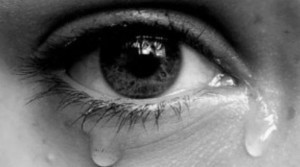Last week I was at the funeral of a dear friend. He was young, had a beautiful wife and two teenage sons, an extremely accomplished man, very successful and loved by all who knew him. He has a mother, sister, many close friends and colleagues. Apart from his family, hundreds of friends and acquaintances rushed to the funeral… shattered. Funeral wreaths flooded the church courtyard. Pavlos was undoubtedly a person who had been loved a lot. And yet the weeping at the funeral was silent. The atmosphere weighed down on us with some eyes weepy but even this mourning that takes your breath away, covered in despair, cannot in any way be expressed.
That’s how it is at funerals these days. Respectable. We’ve stopped staying up at wakes for our dead ones, dirgies are forbidden, we are embarrassed to mourn, to weep, to hug. The tears freeze on our eyes but don’t flow, the knot in our stomach cannot be loosened. And yet, if you don’t cry at the funeral of the one you love then where, for heaven’s sake, are you allowed to cry? The message is clear: Don’t overdo it. Don’t cry. Don’t look at others in the eye. If you are more emotional than you should, wear black glasses and keep your gaze low. Be discreet. And don’t forget that hugging is not allowed. Otherwise, we don’t need hugs, we’re strong. And if the dead person was very close – a husband, a child, a mother – so that you feel that you can’t stand on your feet from pain then don’t worry because there’s a solution for you also. Take some pills. No, they can’t take the pain away but at least they’ll protect you from having to come into contact with it.
Western societies, especially the middle classes, appear to be limiting their emotional expression. It is forbidden to cry in public, to show our weakness, to express our despair or fears. Many maintain that this is because “in this society you need to look strong”, but is this the real reason? If we look carefully we’ll notice that the modern city dwellers don’t just disapprove of the expression of negative emotions but positive ones as well. Who hugs? Who declares love? Who laughs loudly? Who cries of joy? Who dances at the bar? Who says thank you full of gratitude in their eyes? Our emotions, whether positive or negative, need to be cloistered. With this so-called respectability we are removing ourselves from our emotions so much that some appear to doubt that they actually exist.
What happens, however, when emotions remain unexpressed? My experience as a psychotherapist has constantly shown that when someone closes the door to emotions that hurt that person, these emotions do not go away but are transformed and move elsewhere. Sorry can become rage, anger can become depression, shame and fear can take the form of neuroticism. Or these emotions can be transformed into psychosomatic illnesses such as eczema or other sickness. Many specialists today agree that there is a direct link between unexpressed emotions and even serious illnesses such as cancer or drug addiction. Personally, I believe that it isn’t coincidental that the aforementioned illnesses appear to bloom more in developed “respectable” societies.
Furthermore, I know that people were created to be able to take the pain that is associated with loss. What cannot be handled is not expressing the pain. I know that a pain shared becomes lighter.
I don’t know how else to put it. Cry when you lose a loved one.
Bye, Pavlos.
Do you have a problem that concerns you? Our resident psychotherapist Zeta Stravopodi is willing to address any personal matters. E-mail her on z.stravopodi@gmail.com
Zoe Stravopodi-Gianno works as a psychotherapist and offers advice to individuals, couples and families. She also coordinates groups interested in achieving self-awareness and personal growth. In 2012, she established “Parents School” to give parents advice as to how to navigate the choppy waters of parenthood regarding the healthy emotional growth of their children.
Ask me anything
Explore related questions





